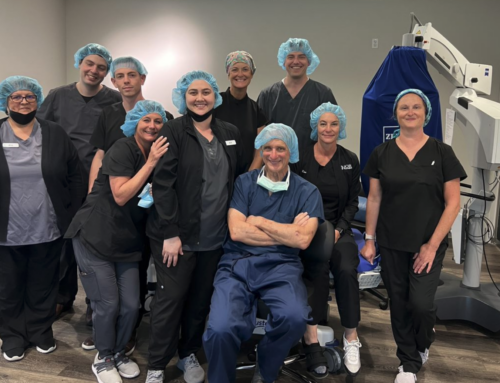
Cataracts affect most older adults at risk for dementia, and now researchers are finding strong evidence that cataract surgery is associated with a lower risk of developing dementia.
The Adult Changes in Thought (ACT) study is a long-standing, Seattle-based observational study at Kaiser Permanente Washington of more than 5,000 participants older than 65. Based on the longitudinal data of over 3,000 ACT study participants, researchers have now found that subjects who underwent cataract surgery had nearly 30% lower risk of developing dementia from any cause compared with those who did not. This lowered risk persisted for at least a decade after surgery. Cataract surgery was also associated with lower risk of Alzheimer disease dementia specifically. The results were reported Dec. 6 in JAMA Internal Medicine.
Lead researcher Dr. Cecilia S Lee, associate professor says, “This kind of evidence is as good as it gets in epidemiology. This is really exciting because no other medical intervention has shown such a strong association with lessening dementia risk in older individuals.” Researchers hypothesize that people may be getting higher quality sensory input after cataract surgery, which might have a beneficial effect in reducing the risk of dementia.
Lee said another hypothesis is that after cataract surgery, people are getting more blue light. “Some special cells in the retina are associated with cognition and regulate sleep cycles, and these cells respond well to blue light,” she said, “Cataracts specifically block blue light, and cataract surgery could reactivate those cells.”
The study results highlight a strong case for further research on the eye-brain connection in dementia. Previous studies by Lee’s group at the UW have shown a strong link between other retinal diseases, such as age-related macular degeneration, and the development of Alzheimer disease and dementia. Subjects with macular degeneration or other retinal degenerative diseases are more likely to develop dementia, In the current study, subjects undergoing vision-improving cataract surgery had lower risk of developing dementia. Further understanding the connection between the aging eye and brain may offer insights and potential therapies to slow or prevent age-related dementia.
The study: Researchers tracked participants diagnosed with a cataract or glaucoma but who did not have dementia at the time they volunteered for the study. Participants also did not have cataract surgery at the time of enrollment. Participants are evaluated every two years for cognitive abilities based on the Cognitive Abilities Screening Instrument, which scores in a range from 0-100. Participants with scores less than 85 undergo further neurological tests.
During follow-up of 3,038 participants (an average of 7.8 years per person), 853 subjects developed dementia, with 709 cases of Alzheimer disease. Approximately half of the participants (1,382 individuals or 45%) had cataract surgery. Analysis for risk of developing dementia showed that subjects who had undergone cataract surgery in either eye were about 30% less likely to develop any form of dementia for at least 10 years after their surgery.
Analysis was adjusted for an extensive list of factors including health-related confounders. Cataract surgery could appear to have a protective effect due to a healthy patient bias, where participants who underwent cataract surgery might have been healthier and at lower dementia risk. Researchers performed analyses to account for several types of potential bias, but still found strong associations when these factors were accounted for.
As another control, participants were also evaluated for a possible link between another type of eye surgery (glaucoma surgery) and dementia. In this case, no association was found.
Read this article on Science Daily: https://www.sciencedaily.com/releases/2021/12/211206113004.htm
 We offer State-of-the-art eye examinations, A unique collection of fashion eye wear, Cataract surgery & consultation, LASIK vision correction, Eye Care Telemedicine. Call Today for an Appointment (707) 955-1120.
We offer State-of-the-art eye examinations, A unique collection of fashion eye wear, Cataract surgery & consultation, LASIK vision correction, Eye Care Telemedicine. Call Today for an Appointment (707) 955-1120.


